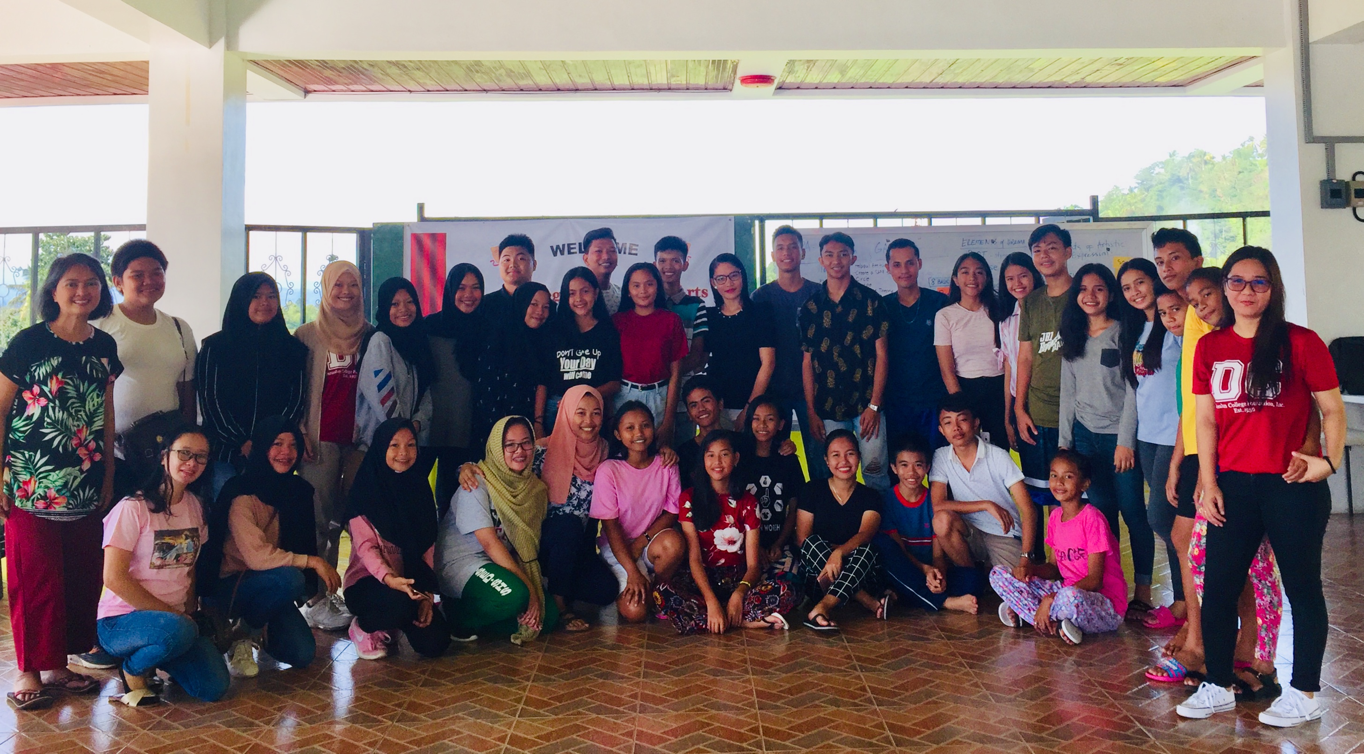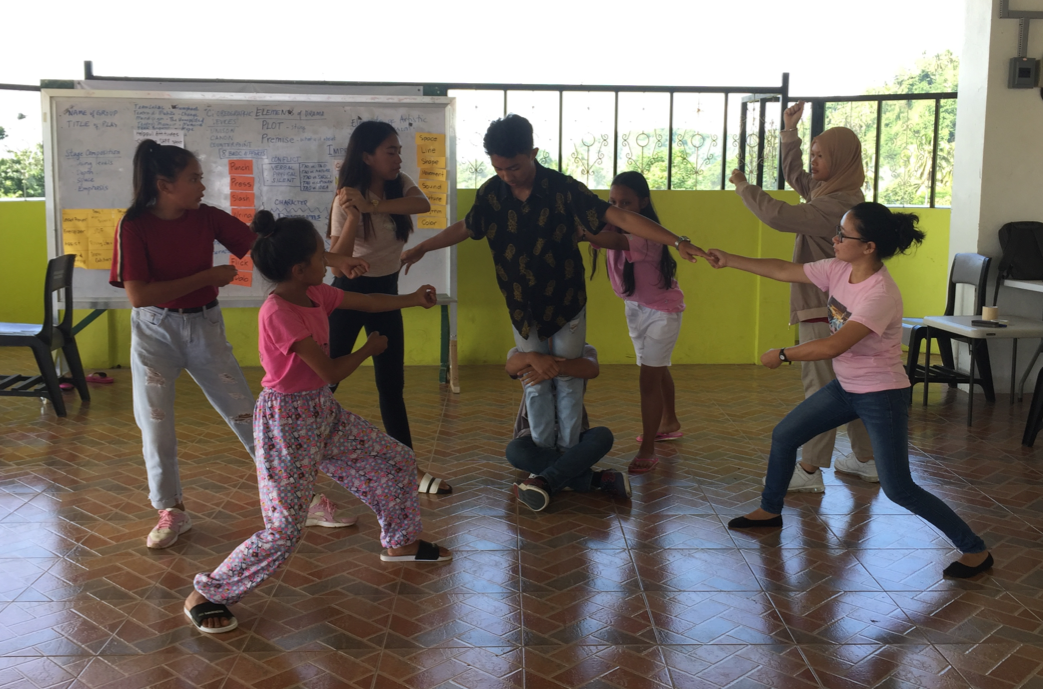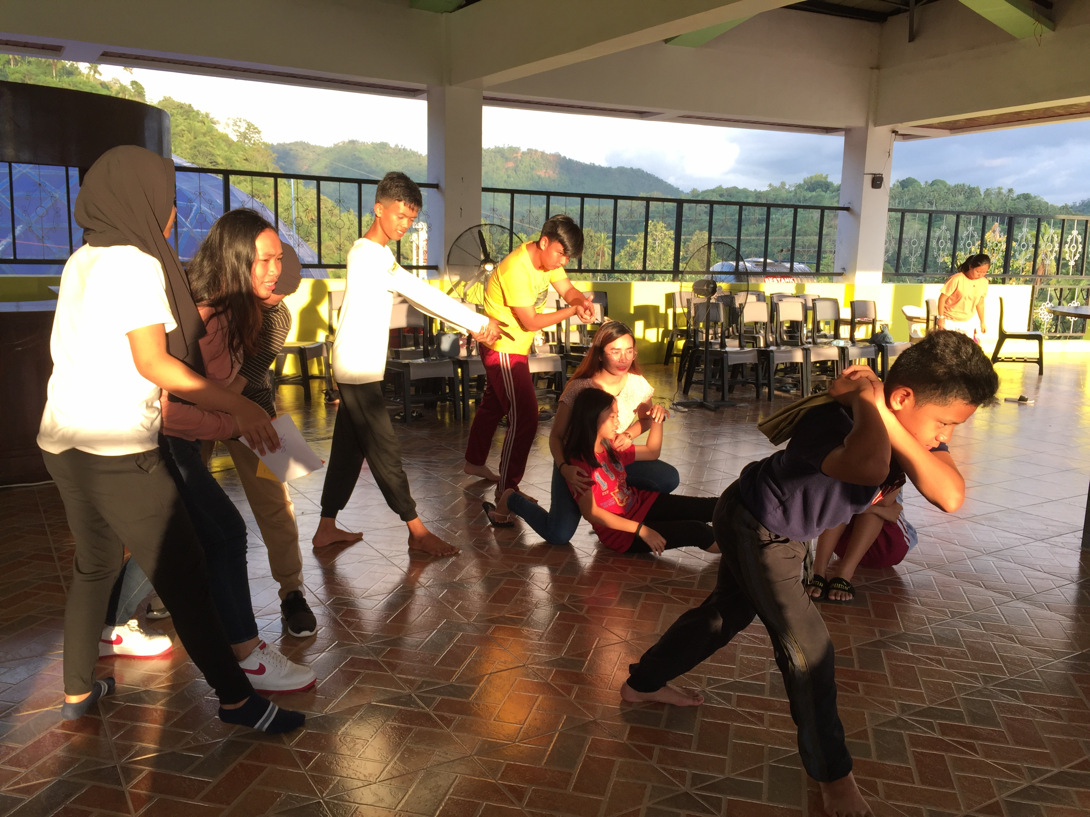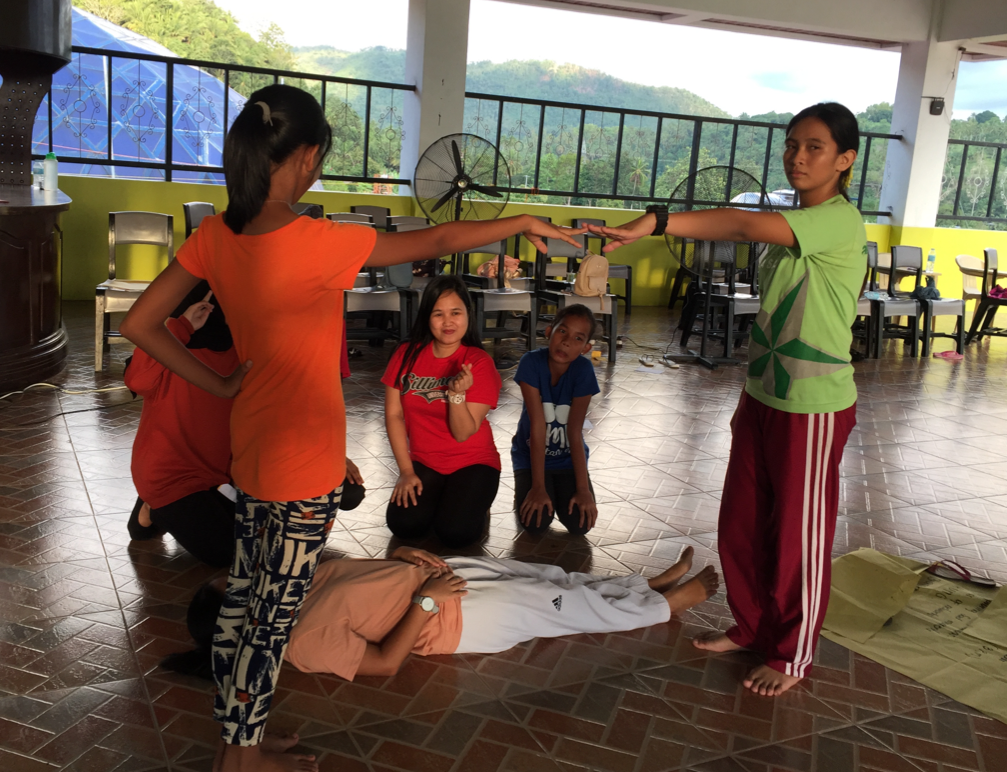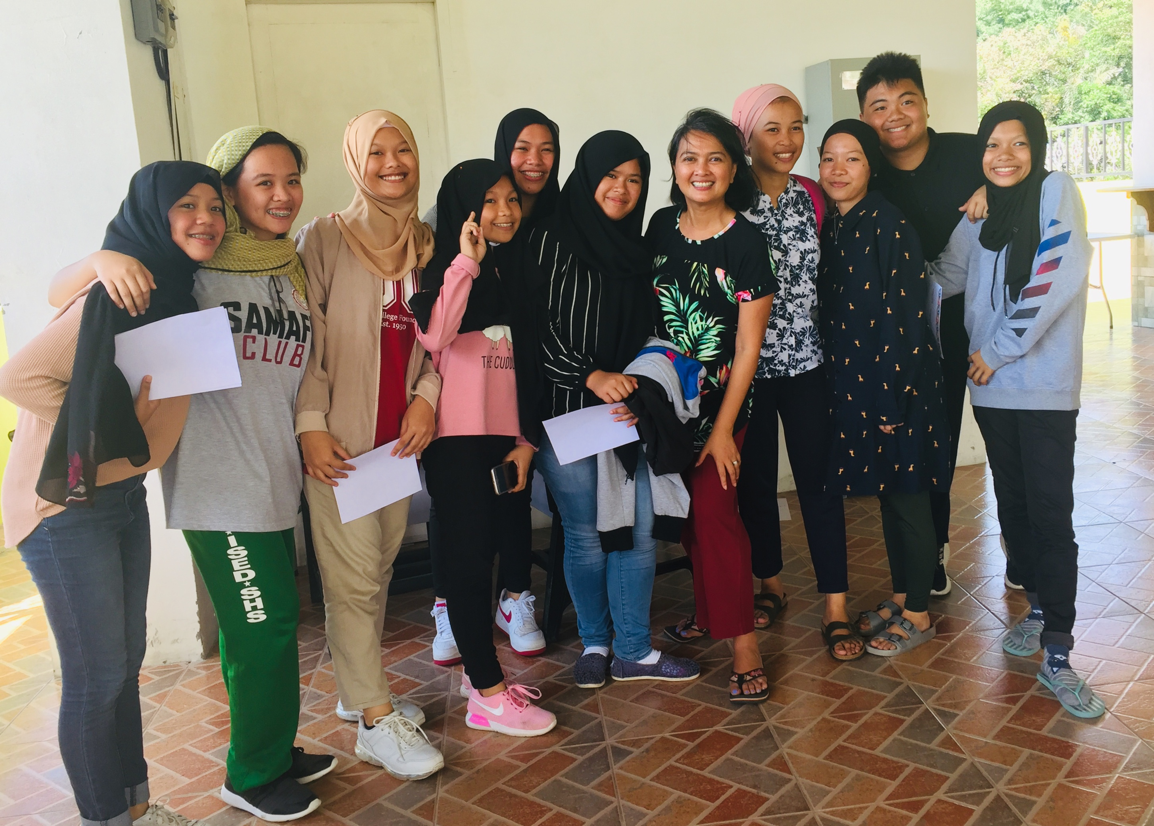A Letter from Cobbie and Dessa Palm, serving in the Philippines
December 2019
Write to Cobbie Palm
Write to Dessa Quesada-Palm
Individuals: Give online to E200393 for Cobbie and Dessa Palm’s sending and support
Congregations: Give to D506901 for Cobbie and Dessa Palm’s sending and support
Churches are asked to send donations through your congregation’s normal receiving site (this is usually your presbytery)
In a recent theater workshop I facilitated in Iligan City in Mindanao, students and some faculty from three high schools related to the United Church of Christ in the Philippines (UCCP), including the Dansalan College Foundation Inc. (Dansalan College), Jimenez Bethel Institute (JBI), and Farmers’ Institute (FI), and some members of the Christian Youth Fellowship of the UCCP-Iligan City, spent three days exploring stories and ways of telling them through the creative use of body, voice and imagination. The workshop coincided with Dansalan College’s 69th Founding Anniversary and was something that I looked forward to doing. In 2018, I met Dr. Fedelinda Tawagon, Dansalan College’s first woman president, who has led the college since 1989, when she joined the roster of awardees for UCCP’s Unsung Heroes.
I have admired Dr. Tawagon’s untiring dedication and service, and it gave me great joy to join their anniversary celebration and to conduct a workshop for the students and teachers.
In one of the drama activities, we asked each youth participant to draw the most significant object they possess, as well as to write down the name of one place that holds valuable memories for them. Like many other young people we have worked with through the last years, quite a number chose their cellphones as the most valuable possession they owned. In many occasions in the past, I would regard this choice with a bit of condescension, “this is so typical,” or even concern, “it’s an addiction.”
But the cellphone took on a different level of significance when told from the prism of those who survived the siege of their school and city.
It was May 23, 2017 when Dansalan College’s security staff saw men, dressed in black, lob bottles filled with gasoline into the campus, setting five buildings of the campus in Marawi City on fire. They subsequently occupied the campus as it offered an ideal vantage point. During the siege, the campus residents fled for safety with nothing but the clothes they were wearing. More than 20 faculty and staff were held hostage for five months, released or escaped at different periods.
The participating students shared in small groups their respective versions of those nightmarish days—how they frantically tried to reach as many family, classmates, teachers and friends through their mobile phones to inform, warn, and comfort each other through the harrowing times. For five months from that fateful day, the once peaceful atmosphere was replaced by bombings, exchange of bullets, and destruction of lives and homes. The cellphone also provided the means to coordinate the escape of those who were left behind.As the students recounted their stories and began to devise a performance piece in their workshop teams, a gamut of feelings was revealed and explored through their objects and identified places. Many portrayed the horrors of the siege, the violence they experienced, and the simultaneous and sometimes conflicting reactions of fear, despair and hope. In some of the scenes they performed, the cellphone became both a means of communicating, and also a receptacle of memories. Many of the survivors are unable to return to their beloved home city, and even if they could, many have no more homes to return to due to the devastation. To some, their few remaining images of their roots are lodged in their mobile phones.
One of their destroyed collective homes is the Dansalan College campus in Marawi City, an institution that has been a historical, educational, and social landmark. The Dansalan College’s history began in 1915 when missionaries Dr. Frank Laubach and his wife Effa Seely arrived in Dansalan (the former name of Marawi) to start a literacy program known worldwide as “Each One Teach One.” In 1950, Dansalan Junior College was established by concerned Christians and Maranao Muslims and was built on Carmelite Hill overlooking the beautiful Lake Lanao.
Christ’s mission is shown in the college’s mission statement: “To develop and nurture, a people of principle, virtue, faith, hope and health in a trans-cultural academic atmosphere of excellence and service.”
Ms. Edna Orteza, Executive Director of the Church Related Educational Action Towards Empowerment-UCCP, wrote in the Dansalan College Story that, “over the years, members of the faculty and staff who were Christians and Muslims became partners in development striving to provide quality education to the youth. They seek to unite Muslims and Christians in friendly relations, exemplify in their lives the best of their culture, commit themselves to ease the tension, and promote peace and development.”
Even in the three days we were together, we witnessed how Christian and Muslim youth can build loving friendships when provided safe spaces for sharing and creative collaboration. Even as they described their horrific experiences, many of the groups sought to articulate a vision of hope and peace.
One group used the metaphor of a tree that was pulled harshly in so many directions that it broke, but at the end, everyone surrounded the broken tree and resolved to replant and regrow the tree. This is akin to an actual tragedy that struck Dansalan College years ago when lawless elements cut and burned down a thousand mahogany trees planted by Dansalan College. Instead of seeking vengeance, the college built a peace garden. We have witnessed time and again that even through strife and acts of violence, Dansalan College does not only pick up the pieces, but transforms the brokenness into a resolve to pursue its vision of a society wherein people live together harmoniously—regardless of race, creed, culture, social status, sex or age through instruction, research, and public service.
In 2020, Dansalan College will be celebrating its 70th Founding Anniversary. I look forward to working with its faculty, staff and students to create a performance about its history and legacy. Even amidst the rubble, Dansalan College is healing and rebuilding its life as a community, and relies on God’s grace and faithfulness through the prayers of and gifts from its partners to plod on and fulfill its mission. We thank you and ask for your continued prayers, solidarity and support for our brothers and sisters in Dansalan College.
Please read this important message from Sara Lisherness, interim director of Presbyterian World Mission
Dear friend of Presbyterian Mission,
Greetings in Christ! As the interim director of Presbyterian World Mission, I am grateful to have the opportunity to thank you for your continued support of PC(USA) mission co-workers.
The enclosed newsletter bears witness to some of the many ways in which God is at work in the world through long-standing relationships between global partners and the PC(USA). These partnerships are nurtured and strengthened by the presence of mission co-workers in over 40 countries; you are an important part of this partnership too, as you learn about and share how our church is involved in global ministry; as you pray for our partners and mission co-workers; and as you take action to work with others for God’s justice, peace and healing.
I write to invite you to continue joining us in partnership in three ways. First, your prayers are always needed. Please pray that God will continue guiding the shared work of the PC(USA) and global partners as we engage together in service around the world. Pray, too, for mission co-workers, that they may feel encouraged in the work they are doing under the leadership of global partners.
Second, please consider making a year-end gift for the sending and support of at least one mission co-worker. There is a remittance form at the end of this letter and an enclosed envelope so that you can send in a special year-end gift.
Finally, I encourage you to ask your session to include one or more mission co-workers in your congregation’s mission budget for 2020 and beyond. PC(USA) mission co-workers’ sending and support costs are funded by the designated gifts of individuals and congregations like yours; your gifts allow Presbyterian World Mission to fulfill global partners’ requests for mission personnel.
Faithfully in Christ,
Sara Pottschmidt Lisherness
Director, Compassion, Peace and Justice Ministry
Interim Director, Presbyterian World Mission
![]() You may freely reuse and distribute this article in its entirety for non-commercial purposes in any medium. Please include author attribution, photography credits, and a link to the original article. This work is licensed under a Creative Commons Attribution-NonCommercial-NoDeratives 4.0 International License.
You may freely reuse and distribute this article in its entirety for non-commercial purposes in any medium. Please include author attribution, photography credits, and a link to the original article. This work is licensed under a Creative Commons Attribution-NonCommercial-NoDeratives 4.0 International License.
